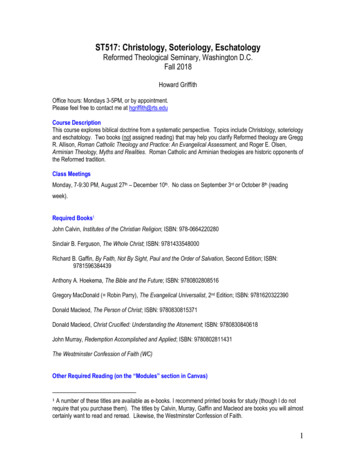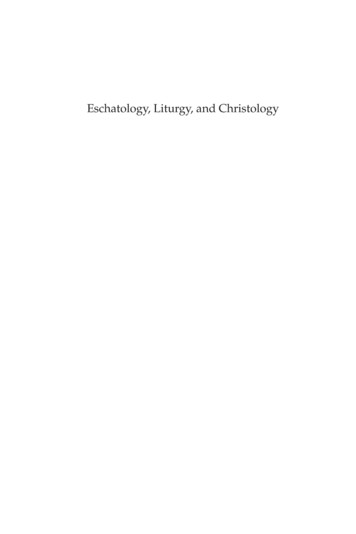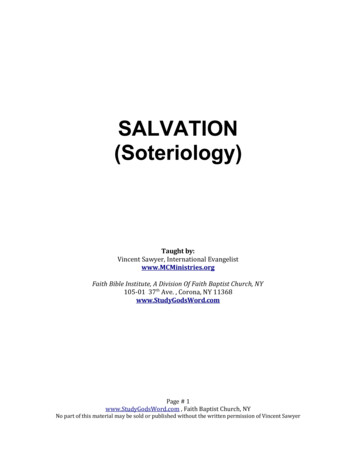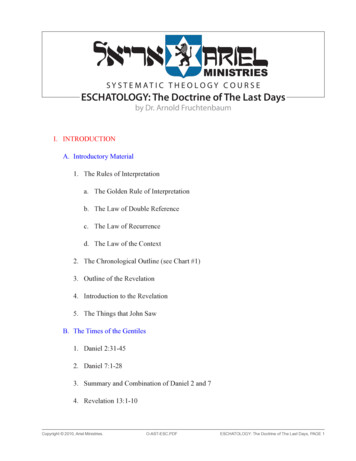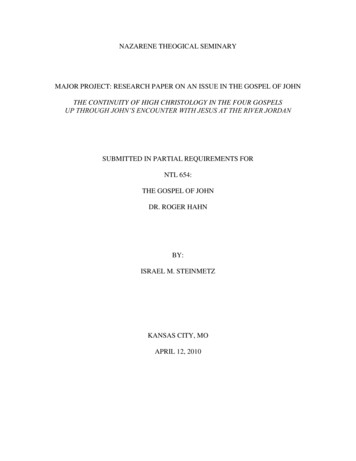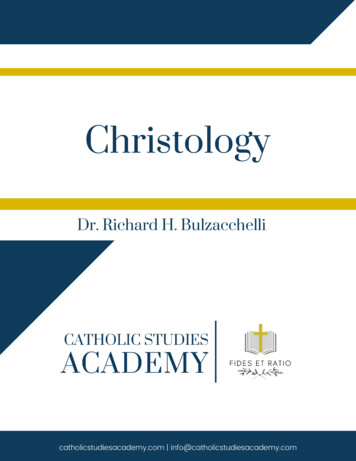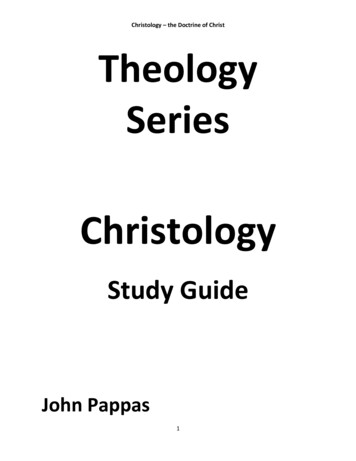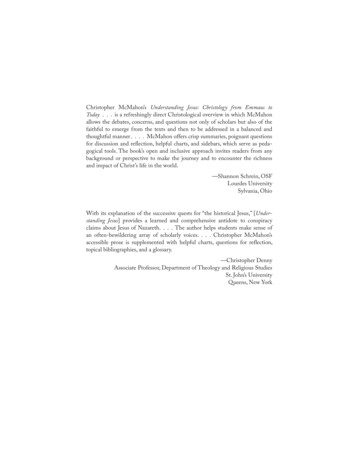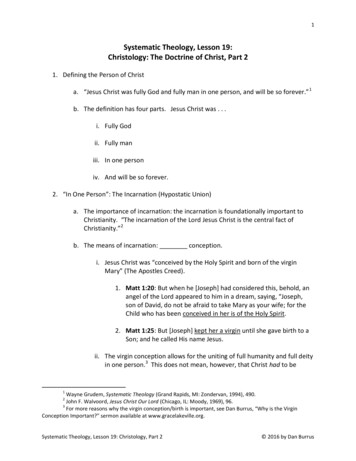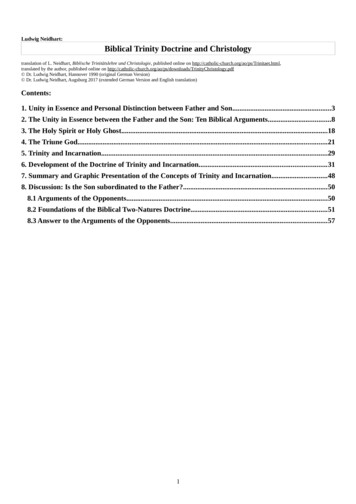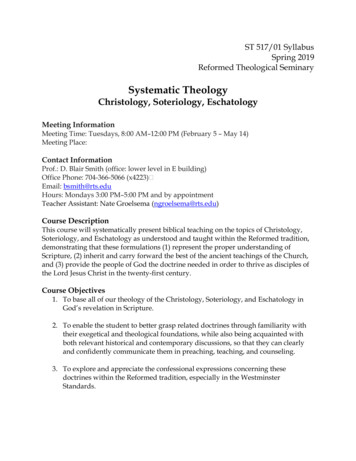
Transcription
ST 517/01 SyllabusSpring 2019Reformed Theological SeminarySystematic TheologyChristology, Soteriology, EschatologyMeeting InformationMeeting Time: Tuesdays, 8:00 AM–12:00 PM (February 5 – May 14)Meeting Place:Contact InformationProf.: D. Blair Smith (office: lower level in E building)Office Phone: 704-366-5066 (x4223)Email: bsmith@rts.eduHours: Mondays 3:00 PM–5:00 PM and by appointmentTeacher Assistant: Nate Groelsema (ngroelsema@rts.edu)Course DescriptionThis course will systematically present biblical teaching on the topics of Christology,Soteriology, and Eschatology as understood and taught within the Reformed tradition,demonstrating that these formulations (1) represent the proper understanding ofScripture, (2) inherit and carry forward the best of the ancient teachings of the Church,and (3) provide the people of God the doctrine needed in order to thrive as disciples ofthe Lord Jesus Christ in the twenty-first century.Course Objectives1. To base all of our theology of the Christology, Soteriology, and Eschatology inGod’s revelation in Scripture.2. To enable the student to better grasp related doctrines through familiarity withtheir exegetical and theological foundations, while also being acquainted withboth relevant historical and contemporary discussions, so that they can clearlyand confidently communicate them in preaching, teaching, and counseling.3. To explore and appreciate the confessional expressions concerning thesedoctrines within the Reformed tradition, especially in the WestminsterStandards.
Texts and AbbreviationsSummary (required)RD:Herman Bavinck, Reformed Dogmatics: Abridged in One Volume, pp. 393-586; 693-777(chapters 14-20; 23-25)THS: Sinclair B. Ferguson, The Holy Spirit, pp. 11-56; 93-189; 241-255 (chapters 1-2; 5-8, 11)ST:Douglas F. Kelly, Systematic Theology, Volume 2; The Beauty of Christ: A TrinitarianVision, pp. 43-259; 295-340; 371-419; 501-513 (chapters 1-5, 7-8, 10, 12 (partial))Confession (required)WCF: The Westminster Confession of Faith (chapters 6-18, 32-33)Supplemental Readings (required – available on Canvas)SR:R. Michael Allen, “The Place of Justification in Christian Theology,” in Justificationand the Gospel: Understanding the Contexts and Controversies, pp. 3-31 (chapter 1)Anselm of Canterbury, “Christ’s Atonement for Sin,” in Readings in ChristianThought, pp. 85-93Richard Bauckham, “Eschatology,” in The Oxford Handbook of Systematic Theology, pp.306-321 (chapter 17)Richard Gaffin, “The Work of Christ Applied” in Christian Dogmatics: ReformedTheology for the Church Catholic, pp. 268-290 (chapter 12)Jonathan Gibson, “For Whom Did Christ Die? Particularism and Universalism in thePauline Epistles” and “The Glorious, Indivisible, Trinitarian Work of God inChrist: Definite Atonement in Paul’s Theology of Salvation,” in From Heaven HeCame and Sought Her: Definite Atonement in Historical, Biblical, Theological, andPastoral Perspective, pp. 289-374 (chapters 12-13)Benjamin L. Gladd and Matthew S. Harmon, Making All Things New: InauguratedEschatology for the Life of the Church, pp. 1-58 (chapters 1-3 – chapter 1 is writtenby G. K. Beale)Michael Horton, “Eschatology,” in Mapping Modern Theology: A Thematic andHistorical Introduction, pp. 377-402 (chapter 15)Richard Lints, “Soteriology,” in Mapping Modern Theology: A Thematic and HistoricalIntroduction, pp. 259-291 (chapter 11)Donald Macleod, “The Work of Christ Accomplished” in Christian Dogmatics:Reformed Theology for the Church Catholic, pp. 243-267 (chapter 11)Maximus the Confessor, “Opuscule 3,” in Maximus the Confessor, pp. 192-198Fred Sanders, “Introduction to Christology: Chalcedonian Categories for the GospelNarrative,” in Jesus in Trinitarian Perspective: An Intermediate Christology, pp. 143 (chapter 1)Extra CreditRead G. K. Beale’s A New Testament Biblical Theology: The Unfolding of the Old Testament in theNew, pp. 88-116; 129-160; 187-297; 651-749; 835-870 (chapters 3, 5, 7-9, 20-21, 25)and write a 5-7 page review 20 points.
Requirements1. Attend and be ready to participate in every class.2. Complete the required reading for each week.3. Weekly Reading Response (10%)Students will upload to Canvas by noon of the day before class meets (Monday) adocument containing two elements: (1) three quotes from the week’s requiredreading, which you found interesting or challenging. You are also to provide (2)a 200 word response (approximately 12 typed lines) to one of the three listedquotes. The quote should not be included in the response. This response is anopportunity to interact with the idea and/or author in a critical (positive ornegative or questioning) manner.4. Reading report (20%)Attached to the second exam, students will turn in a reading report stating thepercentage of the assigned readings that they have read with reasonable careover the course of the semester.5. Term Paper (30%)Students will write a 12-17 page term paper (typed and double-spaced, withappropriate footnoting and bibliography in Turabian style) on one of the topicstreated in the course. Make sure you (1) present a clear thesis; (2) have a properintroduction and conclusion and a clear structure for your essay; (3) deal withthe relevant information competently and fairly to all sides; (4) where necessary,engage primary sources; (5) offer critical analysis (and not merely summary) ofthe positions and views you engage; (6) where relevant, consider the implicationsand significance of your investigation for the life of the church; and (7) use atleast 10 scholarly sources. If it would be helpful, please consult with theprofessor on initial bibliography. Your paper should be on one of the followingtopics:a. The Person of Christ in biblical perspective: One of the most promisingdevelopments in New Testament studies is the “Early High Christology”movement. Major players in this movement include Richard Bauckham andLarry Hurtado. Engage this movement, or one of its proponents, discussingboth its potential contributions and shortcomings for developing a biblicalunderstanding of the Person of Christ.b. Christological heresy: What is an ancient Christological heresy that continuesto manifest itself? Explain this heresy theologically (including biblical texts towhich it might have appealed), how the early Church addressed it, and waysit continues to have life in the understanding of some Christians. Include in
c.d.e.f.g.h.i.j.k.your evaluation how this heresy has a deleterious effect in accuratelypresenting the biblical picture of, and bringing honor to, Christ.Jesus Christ’s Humanity: Was it necessary, as some theologians have said(Karl Barth, TF Torrance, Edward Irving, etc.), that the humanity Christassumed be “fallen”? Evaluate this position biblically and theologically.Through consultation with the professor, you could also explore some otheraspect of Christ’s humanity.“He descended into hell”: Examine this line from the Apostles Creedexegetically and theologically. Compare and contrast Calvin’s and theHeidelberg Catechism’s position with that of the Westminster Confession of Faith.See also John Frame’s discussion in his recent Systematic Theology. Whichposition best accounts for specific Scriptural texts (Acts 2, Ephesians 4, 1 Peter3 and 4 etc.).“Incarnational Ministry”: Theologically evaluate this increasingly popularministry model. Use tools such as orthodox Christology, the doctrine ofUnion with Christ, and the ministry of the Holy Spirit in order to weighwhether this model presents a biblical framework for the ministry of theChurch in the world.The doctrine of justification: In recent years, certain Protestant scholars andpastors have challenged the traditional Protestant doctrine of justification,suggesting that the Reformers misunderstood Paul’s teaching on this topic.Engage one of these contemporary critics (e.g., N. T. Wright, James D. G.Dunn, a proponent of the “Federal Vision”) and respond to their criticisms inlight of biblical exegesis and the Reformed confessions.The relationship between justification and sanctification: What is therelationship between these two crucial doctrines? How do you demonstratetheir relationship exegetically? How do they “fit together” theologically?How should they be brought to bear and emphasized in counseling and/orpreaching?The doctrine of the atonement: Has the reformed tradition overemphasizedpenal substitutionary atonement? Is this doctrine equivalent to “divine childabuse,” as some have suggested? Are there other biblical models of theatonement that deserve our attention? If so, how should they be situated visà-vis substitutionary atonement?The Holy Spirit and eschatology: How does the Holy Spirit giving ofresurrection life relate to eschatology? How does this connect creation/Eden,the Temple, Christ/Church, and the New Creation? How does this work outpersonally and in the Church?The nature of hell: Contemporary evangelicals continue to debate both thepossibility and nature of eternal punishment. Debated questions include:Who goes to hell, if anyone? How does our understanding of hell relate toour understanding of God’s love and of Christ’s atoning work? What is thenature of hell? Does hell involve eternal conscious punishment, or does hellsimply annihilate unbelievers?Other topics/questions may be chosen in consultation with the professor.*Due: May 7th
6. Exams (40%)Students will take two exams which will test your grasp of doctrinal topicscovered in class lectures and readings as well as your ability to communicatedoctrinal topics in a clear and cogent manner. The Midterm covers the first halfof the course, and the Final covers the second half.*Midterm Exam: March April 1-5 *Final Exam: May 16-21Class Policies1. On Laptops and Smartphones in ClassIt is my recommendation that you take notes by hand using the hardcopy outlines Iwill provide before class. If you have a strong inclination to use your laptop, pleaseput your word processing program in “full screen” mode or use the “do not disturb”function so that other applications on your computer do not grab your attention(Facebook, Twitter, etc.).Please keep your smartphone in your pocket on vibrate. If you do not have a pocket,please put it facedown on your desk. Only check them on breaks or if you arereceiving repeated notifications indicating an emergency.2. Internet PolicyRTS Charlotte recognizes how essential it is for students to have reliable,campus-wide access to the internet. For that reason, we have made Wi-Fiavailable for our student body, not only in the library and student lounges, butalso in the classrooms. We know that students need to use the internet todownload class materials, access files on the Cloud, and locate other importantinformation. However, we also recognize that internet access in the classroomprovides opportunity for abuse and misuse. Some students have unfortunatelyused their internet access to engage in many activities that distract them from theclassroom lectures (e.g., surfing the web, checking sports scores, playing games).Not only does such activity hamper a student’s own seminary education, but itdistracts other students who can easily view the screens of nearby students. Inaddition, donors and classroom guests (who often sit in the back) can see thisinappropriate internet usage, which reflects poorly on RTS. Classroom etiquetteincludes leaving cell phones turned off, refraining from surfing the Internet orplaying computer games or other distracting activities. In addition, studentsmust respect standards set by individual professors regarding the use oftechnology during their class.In order to address this issue, we must appeal to the integrity of the students asones who are preparing for a lifetime of ministry to Christ and his church. Weexpect each student to take personal responsibility for proper classroom
technology usage and to encourage others around them to do the same. All RTSCharlotte students are accountable to the policies stated in the StudentHandbook and Academic Catalog and are therefore expected to use technologyin the classroom only for appropriate class-related activities. Student conduct isunder the supervision of the Dean of Students.3. Procedures for taking your Midterm Exam:a. Install the LockDown Browser application on the computer you intend to usefor exams, prior to sitting for the exam, using this oad.php?id 998253613 This link is ONLY for RTS students and covers Mac and Windowsapplications. Be sure that you are able to login to your Canvas account from theLockDown Browser before scheduling a time to take your exam. The LockDown Browser application is already installed on the computersin the RTS Charlotte library. (Note that if you elect to use the librarycomputers, your proctor must still be present throughout the duration ofthe exam.) If you use internet filtering software (for example, Covenant Eyes) youshould disable it before beginning an exam with LockDown Browser.Some types of filtering software can block your computer’s connection toCanvas. Also, please be sure to add an exception for our Canvas URL:https://rts.instructure.comb. Make arrangements with a proctor to supervise the exam within the datetimeframe set by the professor. The proctor cannot be a family member,current RTS student (current taken a class within the past year but not yetgraduated), or member of the library staff. Typical proctors are pastors orchurch staff members. For your convenience, there will be several oncampus proctor blocks where a proctor will be available to supervise yourexam. Dates and times will be posted on Canvas and announced in theweekly Semper.c. The proctor must observe student taking exam and ensure that there are nodevices or resources available other than the computer being used for theexam.d. Access the exam during the date window specified for that midterm:i.Start the LockDown Browser application using a wired or knownreliable WIFI connection. We do not recommend using restaurant orcoffee shop WIFI to take exams.ii.Have your student ID number available to input into the exam.iii.If you use internet filtering software, you should disable it beforebeginning an exam with LockDown Browser.
iv.v.vi.vii.viii.ix.x.xi.Login to your Canvas account using your Self-Service username andpassword. If you need to reset your Self-Service password, you may doso at https://selfservice.rts.edu .Navigate to the exam. You will not be able to access the exam with astandard web browser. For additional details on using LockDownBrowser, review this Student Quick Start Guide (PDF).Time clock will begin once you open the exam.Exam must be completed in one sitting. You may not exit and return toexam later.The exam will contain questions requiring the proctor contactinformation, an honor pledge, and certification that your proctor waspresent during the entire exam period.The proctor must confirm completion at the end of the exam byemailing proctor.charlotte@rts.edu, including the Course Name &Student Name in the email subject line. There is a question in the examwhich will prompt you to ask your proctor to send this email.Proctors may be contacted to verify information regarding examadministration.In the rare case of a technical issue (for example, if internet service goesout during exam), the proctor should contact the course TA. While theTA’s may not be immediately available, the date and time of the emailwill document when the issue was reported. Please have your TA’scontact information available for your proctor before opening the exam.Once you open the exam using the LockDown Browser, you will not beable to access other programs on your computers.Class Schedule, Reading Schedule, and AssignmentsClass 1 – Tuesday, February 5Topic: Introduction: Covenant of RedemptionRD: pp. 393-403 (chapter 14 [partial])THS: pp. 11-33 (chapter 1)ST: pp. 43-70 (chapter 1)WCF: Chapters 6-8*These should be read before the first day of class.Class 2 – Tuesday, February 12Topic: Christ in ScriptureST: pp. 71-100; 139-181 (chapters 2-3)*Assignment: Weekly Reading Response 1 (see details above)Class 3 – Tuesday, February 19
Topic: The Incarnation 1SR: Fred Sanders, “Introduction to Christology: Chalcedonian Categories for theGospel Narrative,” in Jesus in Trinitarian Perspective: An IntermediateChristology, pp. 1-43 (chapter 1)ST: pp. 183-217 (chapter 4)*Assignment: Weekly Reading Response 2Class 4 – Tuesday, February 26Topic: The Incarnation 2SR: Maximus the Confessor, “Opuscule 3,” in Maximus the Confessor, pp. 192-198THS: pp. 35-56 (chapter 2)RD: pp. 403-412 (chapter 14 [partial])ST: pp. 229-259 (chapter 5)*Assignment: Weekly Reading Response 3Class 5 – Tuesday, March 5Topic: The Incarnation 3RD: pp. 412-422 (chapter 14 [partial])ST: pp. 295-340 (chapters 7-8)*Assignment: Weekly Reading Response 4Class 6 – Tuesday, March 12Topic: Redemption Accomplished 1RD: pp. 423-448 (chapter 15)SR: Donald Macleod, “The Work of Christ Accomplished” in Christian Dogmatics:Reformed Theology for the Church Catholic, pp. 243-267 (chapter 11)ST: pp. 371-419 (chapter 10)*Assignment: Weekly Reading Response 5SPRING BREAK – March 19 – No ClassClass 7 – Tuesday, March 16Topic: Redemption Accomplished 2RD: pp. 449-469 (chapter 16)SR: Anselm of Canterbury, “Christ’s Atonement for Sin,” in Readings in ChristianThought, pp. 85-93Jonathan Gibson, “For Whom Did Christ Die? Particularism and Universalism inthe Pauline Epistles” and “The Glorious, Indivisible, Trinitarian Work ofGod in Christ: Definite Atonement in Paul’s Theology of Salvation,” in FromHeaven He Came and Sought Her: Definite Atonement in Historical, Biblical,Theological, and Pastoral Perspective, pp. 289-374 (chapters 12-13)ST: pp. 501-513 (chapter 12 [partial])*Assignment: Weekly Reading Response 6
Class 8 – Tuesday, April 2Topic: Redemption Applied 1RD: pp. 473-503 (chapter 17)THS: pp. 93-113 (chapter 5)SR: Richard Gaffin, “The Work of Christ Applied” in Christian Dogmatics: ReformedTheology for the Church Catholic, pp. 268-290 (chapter 12)Richard Lints, “Soteriology,” in Mapping Modern Theology: A Thematic andHistorical Introduction, pp. 259-291 (chapter 11)WCF: Chapters 9-18*Take Midterm Exam in the Library between April 1-5. It will cover Classes 1-7.Class 9 – Tuesday, April 9Topic: Redemption Applied 2RD: pp. 504-552 (chapters 18-19)THS: pp. 115-138 (chapter 6)*Assignment: Weekly Reading Response 7Class 10 – Tuesday, April 16Topic: Redemption Applied 3RD: pp. 553-570 (chapter 20 (partial))SR: R. Michael Allen, “The Place of Justification in Christian Theology,” inJustification and the Gospel: Understanding the Contexts and Controversies, pp. 331 (chapter 1)*Assignment: Weekly Reading Response 8Class 11 – Tuesday, April 23Topic: Redemption Applied 4RD: pp. 570-586 (chapter 20 (partial))THS: pp. 139-189 (chapters 7-8)*Assignment: Weekly Reading Response 9
Class 12 – Tuesday, April 30Topic: Introduction to EschatologyTHS: 241-255 (chapter 11)SR: Richard Bauckham, “Eschatology,” in The Oxford Handbook of Systematic Theology,pp. 306-321 (chapter 17)G. K. Beale, “The End Starts at the Beginning,” in Making All Things New:Inaugurated Eschatology for the Life of the Church, pp. 1-14 (chapter 1)Michael Horton, “Eschatology,” in Mapping Modern Theology: A Thematic andHistorical Introduction, pp. 377-402 (chapter 15)WCF: Chapters 32-33*Assignment: Weekly Reading Response 10Class 13 – Tuesday, May 7Topic: Last Things 1RD: pp. 693-748 (chapters 23-24)SR: Benjamin L. Gladd and Matthew S. Harmon, “The Nature of the End-TimeChurch,” in Making All Things New: Inaugurated Eschatology for the Life of theChurch, pp. 15-35 (chapter 2)*Assignment: Term PaperClass 14 – Tuesday, May 14Topic: Last Things 2RD: pp. 749-777 (chapter 25)SR: Benjamin L. Gladd and Matthew S. Harmon, “Life in the Overlap of the Ages,”in Making All Things New: Inaugurated Eschatology for the Life of the Church,pp. 37-58 (chapter 3)Last Day of Class*The Final Exam will be taken during the exam period: May 16-21.For Further Reading
In addition to systematic theological works that would be helpful to consult, such asthose by Calvin, Turretin, Hodge, Berkhof, Frame, and Bray, the following books willassist further study of the doctrinal topics discussed in this course.Khaled Anatolios, Retrieving Nicaea: The Development and Meaning of TrinitarianDoctrineKarl Barth, Church Dogmatics, 4 vols.Richard Bauckham, God Crucified: Monotheism and Christology in the New TestamentG. C. Berkouwer, Faith and SanctificationMichael Bird, Craig A. Evans, Simon J. Gathercole, Charles E. Hill, and Chris Tilling,How God Became Jesus: The Real Origins of Belief in Jesus’ Divine NatureWilhelmus à Brakel, The Christian’s Reasonable Service, 4 vols.James Buchanan, The Doctrine of JustificationD. A. Carson, The Difficult Doctrine of the Love of GodCatechism of the Catholic Church, 2d editionGordon Fee, Pauline ChristologyRichard B. Gaffin, “By Faith, Not By Sight”: Paul and the Order of SalvationSimon Gathercole, Defending Substitution: An Essay on Atonement in PaulEdward R. Hardy, ed., Christology of the Later FathersCharles E. Hill and Frank A. James, III, eds., The Glory of the Atonement: Biblical,Theological, and Practical PerspectivesGrant Macaskill, Union with Christ in the New TestamentDonald Macleod, Christ Crucified: Understanding the AtonementRichard Muller, Calvin and the Reformed Tradition: On the Work of Christ and the Orderof SalvationJohn Murray, Redemption Accomplished and AppliedAidan Nicols, Chalice of God: A Systematic Theology in OutlineJohn Owen, Brief Declaration and Vindication of the Doctrine of the Trinity [includes achapter, “Of the Satisfaction of Christ”] in Works of John Owen, vol. 2John Owen, Christologia in Works of John Owen, vol. 1John Owen, Overcoming Sin and Temptation, ed. Kelly M. Kapic and Justin TaylorRobert A. Peterson, Hell on Trial: The Case for Eternal PunishmentJ. C. Ryle, Holiness: Its Nature, Hindrances, Difficulties, and RootsFriedrich Schleiermacher, The Christian FaithJohn Stott, The Cross of ChristKathryn Tanner, Christ the KeyJ. van Genderen and W. H. Velema, Concise Reformed DogmaticsCornelis P. Venema, But for the Grace of God: An Exposition of the Canons of Dort. The Promise of the FutureHerman Witsius, The Economy of the Covenants Between God and ManN. T. Wright, The Resurrection of the Son of God
Course Objectives Related to MDiv Student Learning OutcomesWith T517D. Blair SmithCharlotteSpring 2019MDiv Student Learning OutcomesRubric Articulation(oral &written)Broadly understands and articulates knowledge, bothoral and written, of essential biblical, theological,historical, and cultural/global information, includingdetails, concepts, and frameworks.StrongScriptureSignificant knowledge of the original meaning ofScripture. Also, the concepts for and skill to researchfurther into the original meaning of Scripture and toapply Scripture to a variety of modern circumstances.(Includes appropriate use of original languages NoneStudents are required to expressand articulate views based onreadings, research, and classlectures, while incorporating theirown viewpoints.The emphases of this course,Christology, Soteriology, andEschatology, each find theirexplanation by returning to theScriptures for understanding.
hermeneutics; and integrates theological, historical,and cultural/global perspectives.)Significant knowledge of Reformed theology andpractice, with emphasis on the tes a love for the Triune God that aids thestudent’s sanctification.StrongDesire forWorldviewBurning desire to conform all of life to the Word ofGod.ModerateWinsomelyReformedEmbraces a winsomely Reformed ethos. (Includes anappropriate ecumenical spirit with other Christians,especially Evangelicals; a concern to present theGospel in a God‐honoring manner to non‐Christians;and a truth‐in‐love attitude in disagreements.)StrongPreachAbility to preach and teach the meaning of Scriptureto both heart and mind with clarity and enthusiasm.ModerateWorshipKnowledgeable of historic and modern Christian‐worship forms; and ability to construct and skill tolead a worship service.StrongShepherdAbility to shepherd the local congregation: aiding inspiritual maturity; promoting use of gifts and callings;and encouraging a concern for non‐Christians, bothin America and worldwide.ModerateChurch/WorldAbility to interact within a denominational context,within the broader worldwide church, and withsignificant public issues.ModerateReformedTheologyAlthough Scripture is the primaryvoice in this course, much of it isinterpreted in the light of reformedtheology, and backed up by theWestminster Standards.Students will not only learntheological truths about Christ,salvation, and the end times, butwill also be taught how to vieweach of these in a biblically soundperspective.Seeing life through the lens of anaccurate understanding ofChristology, Soteriology, andEschatology affects everything thatwe do.Because each of these arecontroversial topics, other viewsare considered, discussed, andaddressed in light of Scripture.whodisagree.The content of this class will helpstudents to better understandthese controversial issues, thusgreatly aiding their preaching.This course will be instrumental forstudents in understanding many ofthe elements in the worshipservice.The content of this class issignificant in aiding leaders to notonly lead their congregations tomaturity, but also to safeguardagainst erroneous doctrine in thechurch.This class utilizes the teachings ofthe Church Fathers and othertheologians from throughouthistory, and thereby offers a richemphasis on history. Many of theissues that the church has faced inthe past continue to plague thechurch today, and this course offersorthodox responses to those issues.
Reformed Theology for the Church Catholic, pp. 243-267 (chapter 11) Maximus the Confessor, “Opuscule 3,” in Maximus the Confessor, pp. 192-198 Fred Sanders, “Introduction to Christology: Chalcedonian Categories for the Gospel Narrative,” in Jesus in Trinitarian Perspective: An Intermediate
